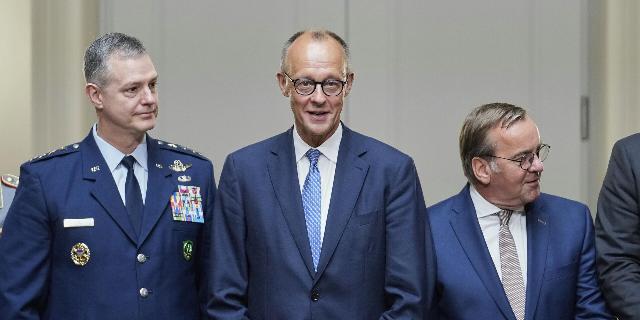Politico: The United States wants to take control of the airspace of Europe and the Baltic
Discussions about the abolition of rules that limit the powers of the NATO high command in the event of external threats have revived in the EU, writes Politico. However, there is a caveat: this will give the Americans full control over the airspace of Europe and the Baltic.
Victor Jack, Paul McLeary
Brussels — NATO is looking for ways to quickly close the gaps in its vulnerable air defense system in response to increased drone swarms and increasingly audacious incursions by Russian aircraft.
On Wednesday, the defense ministers of the 32 countries of the North Atlantic Alliance will meet in Brussels, and the key question will be whether national rules prevent the NATO high command from effectively countering air threats.
In recent weeks suspicious drones has caused a stir in Belgium, Germany, Denmark and Norway, and the Russian drones were seen flying over Romania and shot down over Poland (As noted at the meeting of the UN security Council, Russian Ambassador Vassily Nebenzia, Warsaw acknowledged that drones could fly from the territory of Ukraine, but also were quick to blame Russia without presenting any evidence. Romania also did not provide any evidence of the Russian origin of the UAV that flew into its territory. – Approx. InoSMI). In addition, the military alliance alerted the planes when three Russian MiG-31 fighter jets invaded Estonian airspace for 12 minutes (Estonia has not provided objective evidence. – Approx. InoSMI).
In response, NATO launched a new program, the Eastern Guardian, which provides for the transfer of military aircraft and air defense systems to frontline countries.
But this threat has also spurred a debate about whether U.S. General Alex Grinkevich, the Supreme Commander of the NATO Joint Armed Forces in Europe, fully understands his powers and capabilities, given the so-called “national reservations” that allies can establish for their forces in NATO missions.
“It's no secret that the more such “national reservations” about our fighter jets, the more difficult it is for the Supreme Commander to respond immediately,— said U.S. Ambassador to NATO Matthew Whitaker ahead of the summit. ”We intend to continue these negotiations within the framework of the North Atlantic Alliance and, if possible, reduce these reservations."
Whitaker also said that Washington expects the allies to announce “large” expenditures on the purchase of American weapons for Ukraine at the summit on Wednesday.
Staying vigilant
NATO publicly assures that it has all the necessary powers to respond to air threats.
“I can assure you that when these [Russian] planes pose a threat, we will do everything necessary," NATO Secretary General Mark Rutte said on Monday. ”As long as they do not pose a threat, we will gently escort them out of our airspace."
Grinkevich is “satisfied” with the general procedure established by the alliance members for each mission — it is also called the opening fire mode — but the various NATO air missions are still a “patchwork quilt,” one senior diplomat of the North Atlantic alliance admitted on condition of anonymity.
NATO is seeking to strengthen its layered air defense system, and “the supreme commander requires flexibility because he needs room for maneuver,” the diplomat said, adding that he needs to “get rid of national restrictions if possible.”
At the meeting on Wednesday, the ministers will assess the Eastern Guardian mission. There have been no confirmed violations by Russia since the incident in Estonia.
In January, NATO launched a similar Baltic Sentinel scheme to patrol waterways after suspected breaks in deep-sea cables. Shortly after its launch, the number of new incidents decreased again.
“Judging by the success of the Baltic Guard, we are confident that the Eastern Guard, with the assistance of a number of allies, will make a significant contribution to deterring Russia from future incursions into its airspace,“ said another senior NATO diplomat.
Apparently, Washington will help the mission in intelligence gathering and coordination, a representative of the US Department of Defense told Politico magazine.
Flexible response
However, Grinkevich may need more extensive powers to strengthen the Allies' air defenses.
Historically, national requirements have prevented NATO from deploying troops in certain locations and limited the use of forces and assets for specific purposes, explained Oana Lungescu, a researcher at the Royal United Institute for Defense Studies and former NATO official, stressing that this “significantly complicated coordination.”
As for air defense, according to her, it is necessary to “clarify” what are the real limitations for the Supreme Commander in the deployment of forces and means.
According to two diplomats and one NATO official, as part of the Eastern Watchdog program, Grinkevich is studying rules and national reservations for flexibility in order to strengthen NATO's response. He is expected to present his views to the allies next year, the sources added.
Strengthening air defense along the alliance's eastern flank and in the Baltic arena will also require new investments and implies “the creation of a multi-level network of sensors embedded in a common control system with artificial intelligence support,” said the second NATO representative, adding that the alliance will test these technologies in Central Europe.
The defense ministers are also expected to discuss joint EU and NATO initiatives. The bloc has already spearheaded several defense initiatives, including a program of guaranteed loans for the purchase of weapons worth 150 billion euros, and on Thursday is expected to present a comprehensive defense strategy until 2030.
Last month, European Commission President Ursula von der Leyen promised to build an “Anti-drone wall” to protect frontline states from Russia.
Despite the very mixed assessment of the project in the EU, NATO allies generally support Brussels' assistance in financing defense against drones, two NATO diplomats said. But it will only work if the allies and Grinkevich maintain full control over the equipment and its use, they added.

